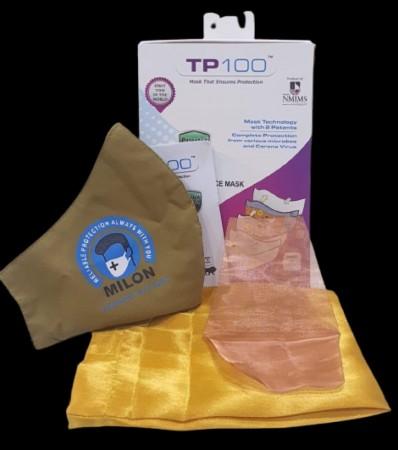Researchers at NMIMS University, Mumbai, have developed a battery-operated reusable mask that offers protection from airborne human pathogens to ward off fears of contracting Covid-19. Compared to Singapore's reusable mask for ten times, NMIMS mask can be used for six months at a stretch.
While regular masks protect from aerogel and large dust particles, they do not protect against most human pathogens. To overcome this, the new mask is made with a four-layered cotton, a metallic mesh to make it act as an electrical filter, said researchers.

During inhaling and exhaling, the pathogens coming in contact with the mask get neutralised instantly, ensuring complete protection to the user. Moreover, the mask is reusable, self-sterilising, and environment-friendly, said the researchers.
The battery lasts for more than six months, if used with proper care, and is replaceable. This mask replaces more than 240 regular masks reducing the environmental burden, and is thus eco-friendly, claimed the researchers.
"We have used a lithium button battery, which can be used and thrown away. It can last up to six to eight months," Neetin Desai, Dean of NMIMS' Sunandan Divatia School of Science in Mumbai, told IANS. "Under laboratory conditions, when continuously used up to 72 hrs, the mask showed 99.9 per cent inhibition of bacterial and fungal growth," Desai added.
The masks will be commercially rolled out and marketed by pharma company Milton Group from next week. It will be priced between Rs 800 to Rs 1,000, he noted.
Singapore's new reusable mask
Scientists from Singapore's Nanyang Technological University (NTU) have also developed a reusable "nanotech mask" that can block 99.9 per cent of bacteria, viruses and particulate matter (PM), as well as kill germs in just 45 seconds, much effective against Covid-19 than the currently used N95 masks.
The mask's novel antimicrobial coating is effective for at least six days and its filtration efficiency surpasses those of N95 masks with 95 per cent filtration of PM0.3. The new masks can also be washed and reused over 10 times, making it more sustainable than conventional disposable masks, but just as easy to breathe in.
The nanotech mask is made with two key components: an antimicrobial coating made from copper nanoparticles and coated on a non-woven fabric mask which has a unique static-electricity property that draws and traps all nanoparticles and germs.
Both are the two most desired properties needed to fight Covid-19, into a single filter, said Professor Lam Yeng Ming, Chair of NTU's School of Materials Science and Engineering.
Copper nanoparticle coating
"In experiments, our copper nanoparticle coating has an extremely fast and sustained antibacterial activity, with a killing efficiency of up to 99.9 per cent when it meets multidrug resistant bacteria. This coating will help to reduce the spread of bacteria as it kills microbes in droplets trapped by the mask fibres, which provide excellent filtration efficiency. This should give users a double layer of protection compared to conventional surgical masks," Lam said
In experiments, the mask was able to attract and trap a broad range of particulate matter: from PM10 (average particle size of 10 microns) to PM0.3 (0.3 microns - about 0.3 per cent or the diameter of a human hair) with a filtration efficiency of 99.9 per cent.
The nanoparticles are also bonded to the fibres within the mask, so there is no contact with human skin when the mask is worn, said Liu Zheng, Associate Professor at the varsity.
(With inputs from IANS)














